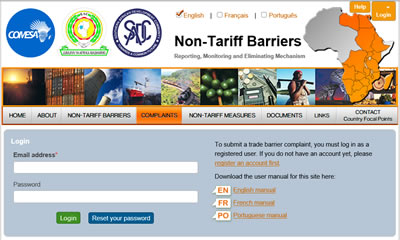With the African Continental Free Trade Area just one ratification away from entry into force, a project gets to work on a new online tool for reporting and resolving trade barriers.
Zambian traders bringing molasses into Botswana on the Kazungula Ferry on 1 December 2016 were surprised when border officials asked for a fumigation certificate.
The import permit didn’t list such a certificate, the Zambians said. But the officials held their ground.
Facing delays, additional costs and the risk of their product going bad, the traders logged the incident via tradebarriers.org, an online tool for private sector operators in 21 countries to report trade barriers they encounter in southern and eastern Africa.
Thanks to the tool, run by the Tripartite Regional Economic Communities and supported by UNCTAD, the issue was flagged to authorities and resolved in May 2017.
It turns out the Zambian exporters were right. “No Sanitary or Phytosanitary import permit is required for liquid molasses and molasses powder and therefore no fumigation certificate is needed for molasses,” the online resolution note says.
But the molasses story is just one of the 583 cases of non-tariff trade barriers resolved through the online mechanism. Often called non-tariff measures (NTMs), these policy measures have non-trade objectives like protecting health and the environment but limit imports and exports.
“Governments have the right to use NTMs to, for example, protect the health of their citizens. But sometimes the measures are protectionism in disguise, distorting trade unnecessarily,” says Pamela Coke-Hamilton, who directs UNCTAD’s trade division.
“Non-tariff measures are the main roadblocks to trade on the African continent – much more than tariffs.”
In fact, a recent UNCTAD report shows that African countries could gain $20 billion per year by tackling the trade distorting effects of non-tariff measures at the continental level – way more than they could pick up by eliminating tariffs.
Tear down these walls
“Tearing down these trade walls is key to regional integration on the continent,” Ms. Coke-Hamilton says one year after leaders signed the landmark African Continental Free Trade Area (AfCFTA) on 21 March 2018 at a special African Union summit in Kigali, Rwanda.
As part of the AfCFTA Protocol on Trade in Goods, regional leaders agreed to establish an African-wide mechanism for reporting, monitoring and eliminating non-tariff barriers.
This mandate and the success of tradebarriers.org spurred a new project to improve and scale up the portal to cover the entire continent. The African Union Commission, the African Regional Economic Communities and UNCTAD will join forces on the endeavour.
With the AfCFTA just one ratification away from entering into force – and creating a $2 trillion market of 1.2 billion people – it’s time to get to work.
The project, funded by the German government, recently kicked off with a workshop from 12 to 14 February in Nairobi, Kenya bringing together officials from the project partners to assess the strengths and weaknesses of all the online tools like tradebarriers.org currently in use across the continent.
The technical proposal for the implementation of the continental tool is now being considered by the regular AfCFTA negotiating structures.

